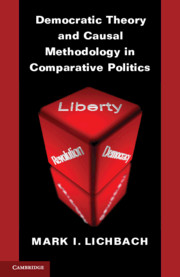Book contents
- Frontmatter
- Contents
- List of Tables
- Preface
- 1 Methodology’s Problem, and Democracy’s Too
- Part I Rationalism and Constructivism
- Part II State-Society and Contentious Politics
- Part III Conclusions: Three Chapters, Five Themes, and Twelve Theses
- 7 Agency
- 8 Research Schools
- 9 Political Power and Democratic Performance
- References
- Index
9 - Political Power and Democratic Performance
Published online by Cambridge University Press: 05 May 2013
- Frontmatter
- Contents
- List of Tables
- Preface
- 1 Methodology’s Problem, and Democracy’s Too
- Part I Rationalism and Constructivism
- Part II State-Society and Contentious Politics
- Part III Conclusions: Three Chapters, Five Themes, and Twelve Theses
- 7 Agency
- 8 Research Schools
- 9 Political Power and Democratic Performance
- References
- Index
Summary
As the paradigmatic debates of the 1960s played themselves out, comparativists came to recognize that rather than being a purely descriptive concept, “democracy” is a judgmental term. As Skinner (1974: 298) remarks, “Such terms are applicable if and only if a certain state of affairs obtains, but whenever the relevant state of affairs does obtain, then to apply the corresponding term is not only to describe the state of affairs, but also (and eo ipso) to perform the speech-act of commending it.” In other words, while comparativists do not necessarily support something they label as “political” or “governmental,” they do approve of something they call “democratic.” After debating questions of “democratic stability,” comparative politics thus came to recognize that the empirical study of democracy had normative significance. The early literature then turned to evaluations of “power” (Eckstein and Gurr 1975) and of “democratic performance” (Eckstein 1971; Powell 1982).
Comparativists nowadays should address the key empirical and normative questions about political power raised by Kohli (Thesis 11) and about democratic performance raised by Tilly (Thesis 12): in building a democratic state, which democracy under which conditions is best, and how might it be achieved? Section 9.1 suggests that returning to the core concern of the 1960s would allow comparativists to address Barrington Moore’s ought/is dilemma of causal collective human agency in democratization. Comparative politics, Section 9.2 suggests, could then come to understand how alternative modernities challenge liberalism, how state building occurs amid contentious world politics, and how institutions arise, persist, and change.
- Type
- Chapter
- Information
- Democratic Theory and Causal Methodology in Comparative Politics , pp. 203 - 218Publisher: Cambridge University PressPrint publication year: 2013



